Power words are like a “cheat code” for writing.
Sprinkle in a few, and you can transform dull, lifeless words into copy that crackles with with power.
They will instantly make you more captivating, charismatic, and persuasive.
How do I know?
Because I’m a world-class writer, and I use them all the time.
From getting noticed and shared by influencers like Tim Ferriss…
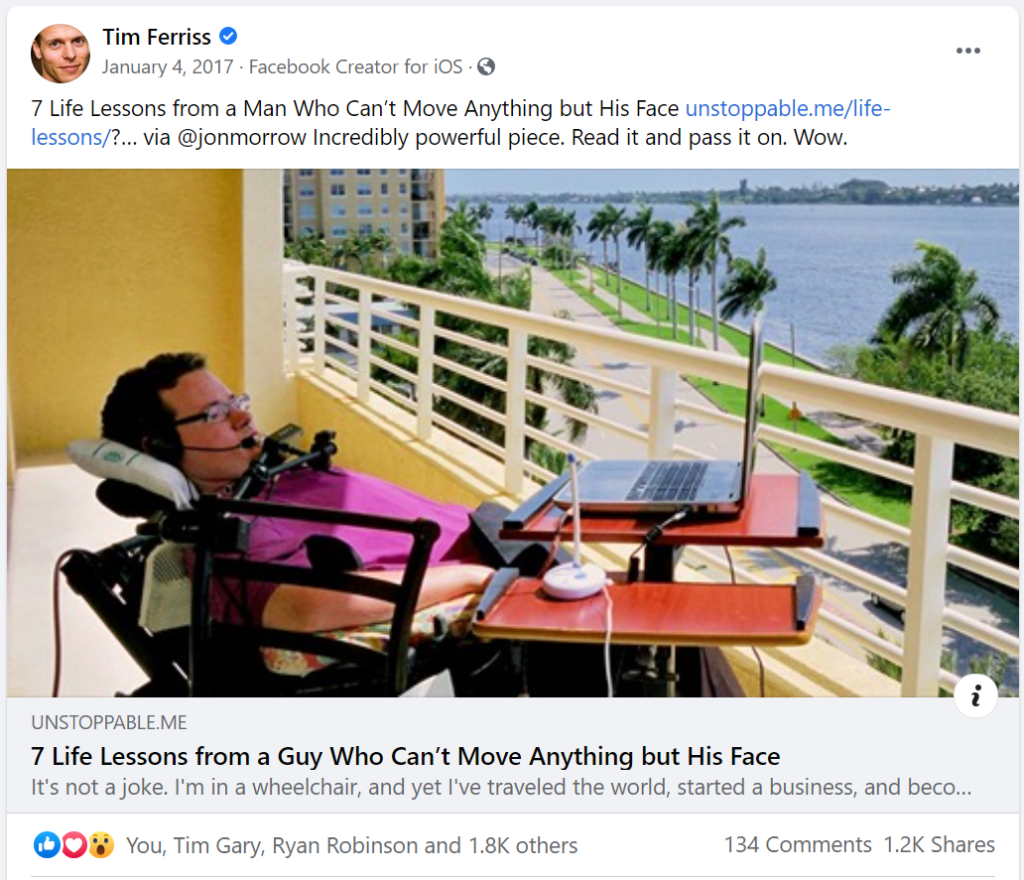
To writing posts like this that get millions of visitors…

To making millions of dollars (despite being in a wheelchair) and living like a king.

Words are my superpower. My addiction. My secret weapon.
And I’m about to give you a master class in how to use them, right here, right now, for free.
Buckle up. We about to go wild.
What are Power Words?
Power words are persuasive, descriptive words that trigger a positive or negative emotional response. They can make us feel scared, encouraged, aroused, angry, greedy, safe, or curious. Authors, freelance writers, copywriters, and content marketers use “power words” to spice up their content and compel audiences to take action.
Clear as mud?
Let’s deconstruct an example from the great Winston Churchill. All the power words are underlined:
Inspiring, right?
Here’s why:
Power Words = Emotional Words Packed with Persuasion
Smart speakers, as well as their speechwriters, sprinkle their speeches with carefully-chosen power words drenched in sensory details, drawing the target audience from one emotion to another as skillfully as any novelist or screenwriter.
And it goes beyond speakers and storytellers.
Email marketing messages, copywriting, infographics, step-by-step tutorials, sales pages, inspirational quotes, content marketing, case studies, calls to action, testimonials, tweets, and other social media posts are all designed to influence the reader (and prospective customers) in some way. You want to pass along information, yes, but you also want the reader to feel a certain way about that information.
Maybe you want to impress them, get them excited, make them cautious, get them angry, encourage them to keep going, trigger curiosity, create urgency, build trust with them, or any number of emotions. The better a job you do at making them feel, the more influential you are, and the better your chances of getting what you want.
Now, let’s go over all the different places you can use them:
Powerful Words in Action: 14 Places Where Strong Words Can Help You
- Headlines
- Subheads
- Email Subject Lines
- Opt-In Boxes
- Homepage
- Business Names/Blog Names
- Product Names
- Sales Pages
- Testimonials
- Bullet Lists
- Button Copy (Call to Action Words)
- Author Bios
- YouTube Videos
- Book Titles
1. Using Power Words in Headlines
Any writer or blogger who’s been in the game for a while knows the headline is the most important part of writing your blog post.
Its purpose, after all, is to entice the reader to read the rest of your content. If your headline fails to get attention, potential readers will ignore it when it shows up in their tweets and social media feeds.
And just one or two power words in your headline is usually enough to make it stand out.
Just look at this headline from BuzzFeed:
Beyoncé Just Unveiled Her Twins To The World In The Most Breathtaking Photo
The word choice of “Unveiled” makes it feel like a secret is being exposed, and the word “Breathtaking” makes you curious to see what the photo looks like.
Here’s another example from BoredPanda:
50+ Adorable Snake Pics That Will Help You Conquer Your Fear
People generally love anything adorable, so this headline will easily catch attention. (The fact that it refers to snakes will only make people more curious.)
The headline then drives it home by using the power verb “Conquer.”
Here’s one from BrightSide:
24 Proofs That Perfect Social Network Photos Are a Shameless Lie
While one or two power words are often enough, this headline proves you can use more when it fits.
This headline has four powerful words, but they feel natural in the headline, which keeps it from feeling like over-the-top clickbait.
Here’s one from Smart Blogger:
10+ Super SMART Goal Examples (& A Handy Template)
“Super”, “Smart”, and “Handy” pack some punch (and some alliteration) into our recent article on SMART goal setting.
Last one:
How to Make Money Writing: 5 Ways to Get Paid to Write
This headline from our guide on making money as a writer incorporates two greed words: “money” and “get paid.”
It’s one of our most popular posts, and its headline’s use of power words is a big reason why.
My personal process for writing headlines:
- I pick an emotion I want the reader to feel
- I ask myself what words create that emotion inside people
- I pack those power words into my headline to give it an emotional punch
The result? More traffic to everything I write.
2. Using Power Words in Subheads
Too many writers overlook the value of subheads, which is a mistake. Once people click on your headline, most will scan the post first to see if it looks worthy of their attention.
Adding some power words to your subheads is a good way to make your post look like an interesting read.
For example, here are three subheads from our post on E-book mistakes:
Three Rock-Solid Reasons to Write Your First E-book
Why Most E-books Are Embarrassingly Bad
Planning Mistakes: How to Doom Your E-book Before You Even Start Writing
See how the power words in these subheads grab your attention and make you want to read the text that follows?
Power words can help with SEO too. Adding an SEO power word to your subheads will compel readers to stick around longer, which will increase your dwell time — a big deal in Google’s eyes.
3. Using Power Words in Email Subject Lines
Having an email list is of little use if only a handful of readers bother to open your emails.
And these days, most people’s inboxes are flooded, so they’re selective in which emails they open.
You can stand out in their inbox and raise your open rates by including power words in your subject lines.
Just look at this one from Ramit Sethi:
The “unspoken rules” of learning
If this subject line would’ve read “The rules of learning,” do you think it would be as appealing? The powerful word “unspoken” is what makes it interesting.
Here’s another one from Cal Fussman:
Manchester: A Lesson in Triumph over Tragedy
Both “Triumph” and “Tragedy” are powerful words full of emotion.
And finally, here’s a good example from AppSumo:
Unleash the power of video chat
The power phrase “Unleash the power” makes you feel this email is hiding something incredibly powerful inside.
See how that works?
When you send out emails to your list, try to add a strong word to your subject line so it stands out in a prospect’s inbox.
4. Using Power Words in Opt-In Boxes
If you’re running a business, one of your main goals is to grow a large and engaged readership, and the best way to do it is by converting readers into subscribers.
That means — unless you’re using a blogging platform like Medium which doesn’t allow them — you should have opt-in forms scattered across your website.
You can place them on your homepage, at the end of your posts, in your sidebar, in a popup, or anywhere else.
But no matter where you place them, your opt-in boxes must catch people’s eye and make them want to share their email address with you. Because they won’t give it away to just anyone.
(Remember, their inboxes are already flooded, so they’re not necessarily eager to get even more emails.)
Fortunately, you can use power words to make your offer more enticing.
As an example, here’s an old popup from Cosmopolitan:
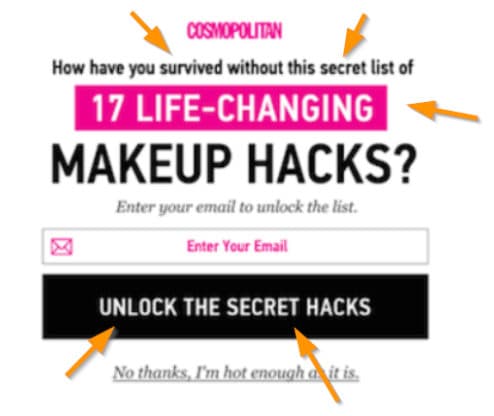
This popup had power words everywhere, but it avoided feeling like overkill. I bet it converted like crazy.
Here’s a slightly more subtle example from Betty Means Business:
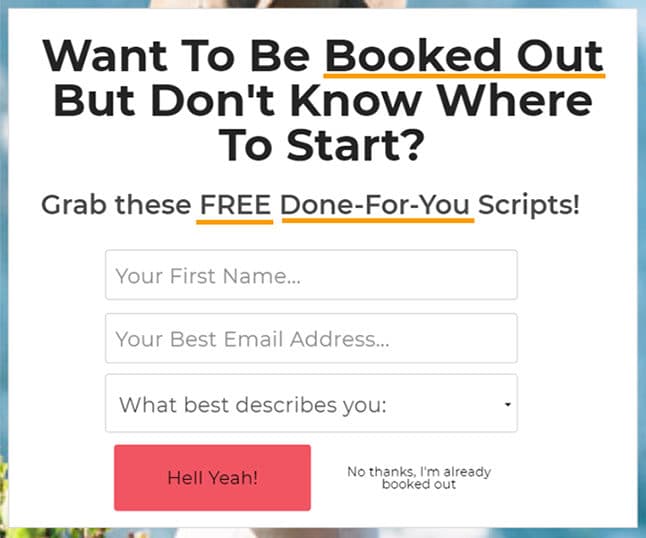
It’s understated, but still quite effective.
Again, you don’t have to overdo it with the power words on these. A little can go a long way.
Here’s one final example from Renegade Planner:

In short:
If you’re not using power words in your opt-in boxes, you’re missing out.
Big time.
5. Using Power Words on Your Homepage
Your homepage is the face of your website and it’s usually one of the most visited pages. Many people who visit your website will see this page first, so you want it to make a good first impression.
Some people use their homepage to promote their email list, others use it to promote one of their products, and others use it as a red carpet — welcoming new visitors and explaining what their site is all about.
In any case, your homepage is a good spot to add a few power words, as it can determine whether people stay (and take the action you want them to take) or leave (never to return).
Look at this value proposition on the homepage for Nerd Fitness:
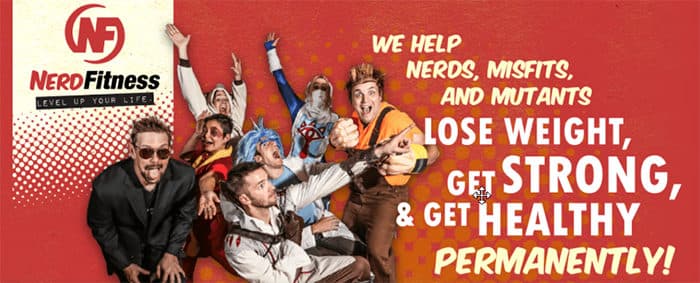
“Nerds,” “Misfits,” and “Mutants” are unusual power words that work well for Nerd Fitness’ target audience. These words immediately separate it from all the other fitness blogs out there.
But they push it even further with “Strong,” “Healthy,” and “Permanently.”
Here’s another value proposition from MainStreetHost’s homepage:

It’s quite minimal, isn’t it? They just wrote down three power words and follow it up with a service they provide.
Of course, you don’t have to limit your use of power words to the top of your homepage.
You can use it in other parts of the homepage too, as Ramit Sethi does here in his list of what you’ll get when you sign up for his email list:
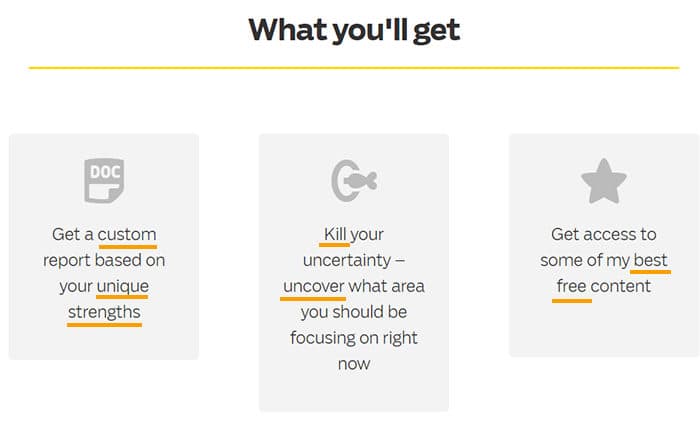
Go look at your homepage now and see if you can find any areas you can spruce up with some power words.
6. Using Power Words in Business Names/Blog Names
Having a forgettable name is poison to your website’s growth. So when you start a blog, you want to make sure you have a name people can easily recall.
If you haven’t chosen your blog name yet (or if you’re thinking about rebranding), you should use a SEO power word to give it some punch. The right word will make you stand out from all the boring, forgettable brands out there.
Just take a look at the collection of blog names below and see how well they’ve incorporated power words:

7. Using Power Words in Product Names
Just like you can use power words to spruce up your blog name, you can also use them to make your product names pack more of a punch.
It can make the difference between your potential customers thinking, “Ooh, this product sounds cool!” and them thinking, “Meh.”
Just check out this subscription product from Nerd Fitness:

It has such a powerful name that you’d almost want to sign up without learning anything else about it. Who wouldn’t want to be part of a community of rising heroes?
Here’s another good example from Pat Flynn:

It’s a powerful name for his podcasting course that instantly informs you of the benefit.
So if you’re about to launch a product (or if you’ve launched a product with a tepid name), consider giving it a power word to make it pack a punch.
8. Using Power Words on Sales Pages
You can also use power words to spruce up the copywriting on your sales pages and make them more effective at selling your e-commerce products or services.
They will grab people’s attention when they arrive on the page, they will keep their attention as they scroll down, and they’ll help seduce readers before they reach your “buy” button.
Just look at this headline on Ramit Sethi’s sales page for his product 50 Proven Email Scripts (which also has a power word in its name):
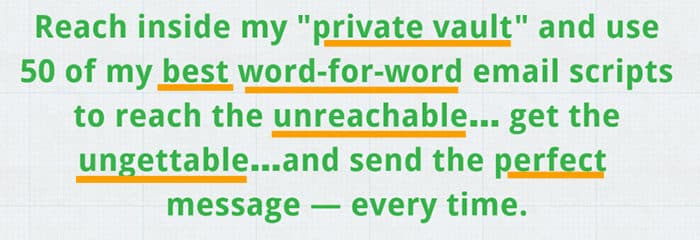
And as you scroll down, you see he keeps using power words throughout his sales page.
His headline is followed by emotion-packed subheads:
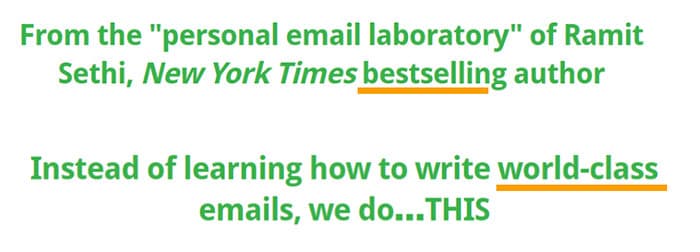
And he even uses power words in his guarantee:

9. Using Power Words in Testimonials
Power words are also tremendously effective in testimonials.
Of course, I’m not suggesting you change people’s testimonials to include power words. But you can certainly select the ones that already use them to great effect.
Just look at this example from Betty Means Business:

Or look at this one from Farideh’s blog:

And here’s another example from Renegade Planner:
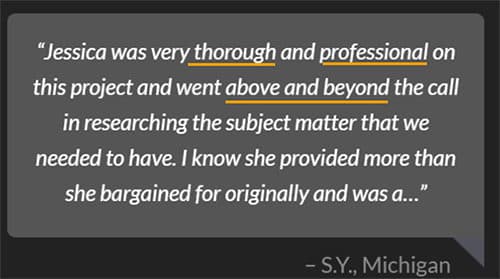
All these testimonials will lend extra credibility and excitement due to their power words and phrases.
10. Using Power Words in Bullet Lists
Many sales pages include a list of benefits of the product they’re selling. Many opt-in forms include a huge list of reasons you should sign up to their email list. And many case studies use bullet lists to quickly summarize information.
You can use power words in these lists to inspire more excitement in your reader as they read through them.
Here’s one example from Ramit Sethi’s sales page for his How to Talk to Anyone course:
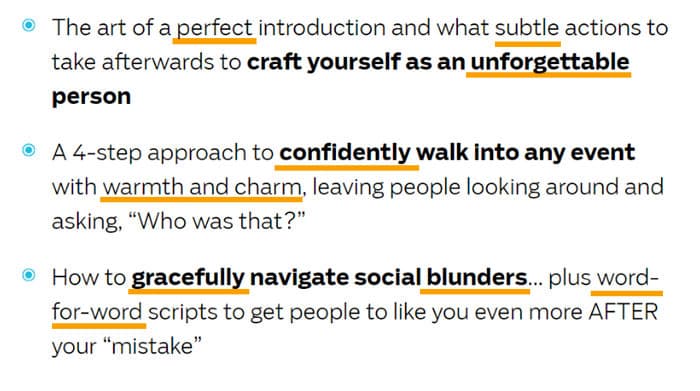
And here’s another example from an opt-in form on Restart Your Style:
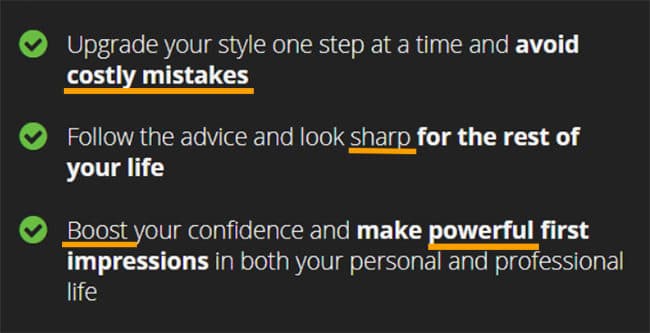
Without these power words, these lists wouldn’t convince nearly as many prospects to buy or subscribe.
11. Using Power Words in Button Copy and CTA (Call to Action Words)
Yep, you can use power words in your CTA button copy too — even if you only have a few words you can fit in there.
One of the most common power words used in buttons is “Free” (as in the example below):
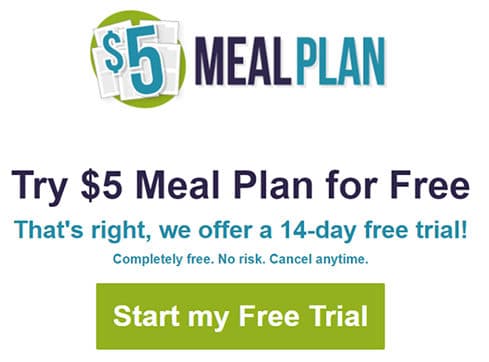
But you can be more creative with buttons than you might think.
Takes this button from the sales page for the book The Renegade Diet:

“Immediate,” “Money Back,” and “Guarantee” are all incredibly powerful words, and the author manages to squeeze them all into one button.
Here’s an example from Tim Ferris:

He could’ve used “Send Me the List” as most people would do, but the specific word “Unlock” makes it sound a lot more intriguing — like you’re getting access to something that’s been kept hidden away.
Now take a look at the buttons on your site.
Do you see any opportunities to spruce them up with a power word?
12. Using Power Words in Author Bios
Your author bio is another extremely important part of your marketing strategy.
When you guest post for another blog (or write a paid article as a freelancer), your author bio has the difficult job of making readers want to know more about you so they click through to your site.
That means your author bio needs to spark attention and interest. And you usually only get three sentences, so you need to carefully consider the words you use.
As an example, here’s the author bio from Henneke Duistermaat in her ultimate guide on overcoming writer’s block:
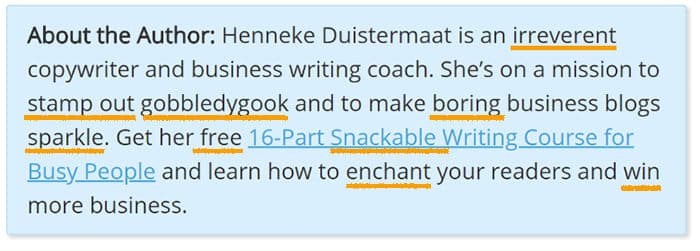
Henneke’s author bio is full of power words. It shows her uniqueness and makes her stand out from other copywriters.
You can tell she has carefully picked each perfect word for maximum impact.
Here’s another example from Sarah Peterson’s post on blog ads:

She opens strong immediately by mentioning her guides are insanely useful. And just the name of her report alone is full of power words: “Free,” “Reveal,” and “Begging.”
Makes you want to get your hands on that report, doesn’t it?
13. Using Power Words on YouTube Videos
If you’re publishing videos on YouTube and you want to get more views, you should use power words in your titles.
All the biggest YouTube channels do this.
They understand most of their views will come from their subscribers finding them in their feeds, and from people finding them in the sidebar of other videos.
In both cases, you’re competing with many other videos for their attention. If you want your video to stand out and be the one they choose to watch, your title has to be captivating.
See how Philip DeFranco does it below:
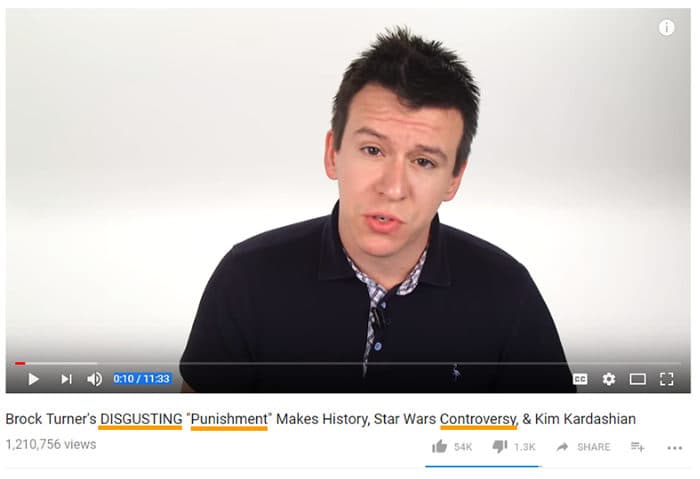
“Disgusting,” “Punishment,” and “Controversy” are all attention-grabbing words (and that’s besides the attention-grabbing names of Brock Turner, Star Wars, and Kim Kardashian).
Note also how he has capitalized “Disgusting.” It’s another smart trick many YouTube channels use to stand out more in YouTube’s lists of video suggestions.
Style vlogger Aaron Marino often does it as well:
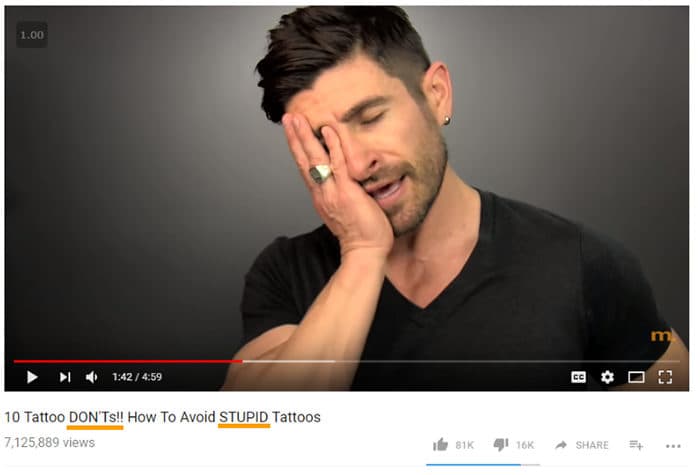
By capitalizing the power words “Don’ts” and “Stupid,” his title catches a lot more attention (as you can see for yourself by the millions of views it’s received).
14. Using Power Words in Book Titles
If you’re interested in writing your own book, adding power words to your titles will help it sell better.
With all the competition in the book market these days, you need a title that grabs people’s attention and makes them want to peek inside.
Here are a few quick grabs from Amazon’s list of bestsellers in the self-help niche:
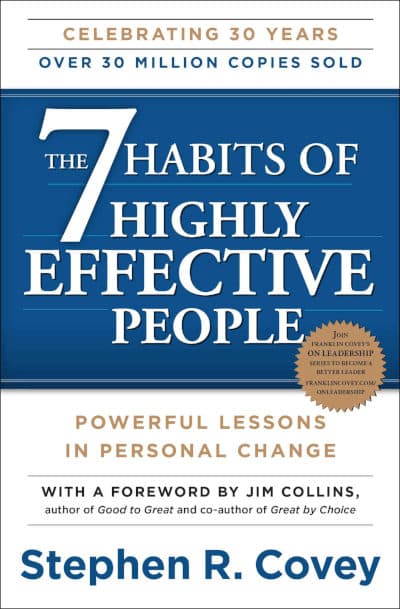
I’m sure you’ve seen this title before.
You might say Stephen Covey’s use of power words in his title has been highly effective. (See what I did there?)
Here’s another:
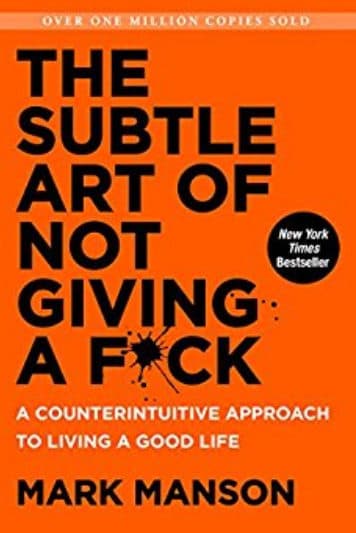
Mark Manson’s bestselling title is packed with power.
The power word “Subtle” juxtaposes well with the F-bomb in the title, and his use of “Counterintuitive” will spark some interest as well.
One more:
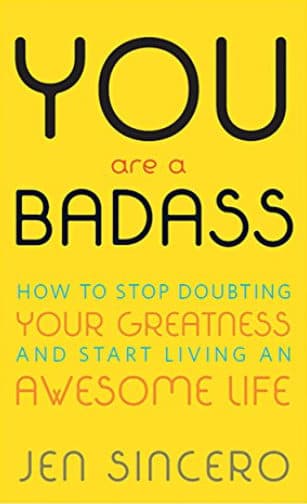
Lastly, Jen Sincero’s encouraging book title makes you want to flip it open and read it in one go.
The use of “Badass” alone will make it stand out in the self-development section, but her use of “Greatness” and “Awesome” in the subtitle truly seals the deal.
Go Ahead and Tell Me. What Powerful Words Did I Miss?
They’re known by many names…
Emotion words. Good words. Strong words. Powerful words, creative words, sensory words, trigger words, persuasive words, curiosity words, descriptive words, impactful words, interesting words, positive words, unique words, action words, and even — yes, seriously — awesome words.
But whatever you call them; smart, attractive people such as yourself have mastered the strategic use of power words and use this valuable communication skill every day to pack their writing with emotion so they can increase conversions.
Want a whole list of 801+ to choose from? Then go here:
Good luck.
And be sure to use them for good, not evil!





